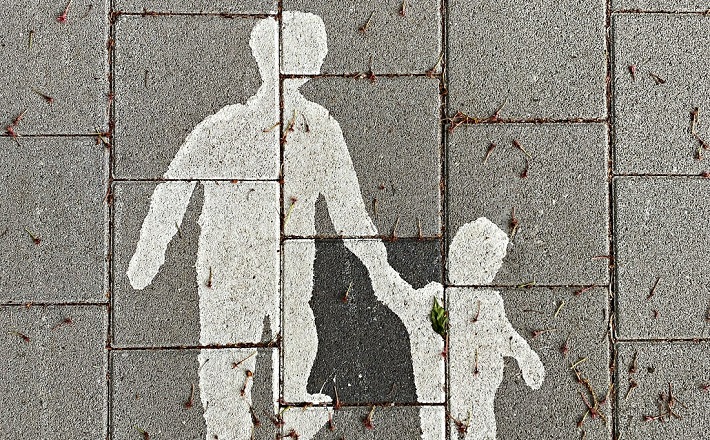In the semicontinuous lectionary this week, we see once again that the prophet Hosea knows his way around a metaphor. Think of a metaphor, ultimately, as a tool for sharpening the imagination. Here, the target is the character of God and the dimensions of the divine-human relationship.1 Hosea digs through his collection, looking for a compelling way to convey what he knows to be true. As Rabbi Abraham Joshua Heschel said, he does this in order to, “flash a glimpse into the inner life of God.”2 He emerges with this: the whole people are one beloved child, and God is a parent down to their last nerve, reckoning with the heartache that comes with learning how loving something this much is nothing short of devastating.
When Israel was a child, I loved him,
and out of Egypt I called my son (Hosea 11: 1)
How can I give you up, Ephraim?
…How can I make you like Admah?
How can I treat you like Zeboiim? (Hosea 11:8a)
They shall come trembling like birds from Egypt,
and like doves from the land of Assyria;
and I will return them to their homes, says the LORD (Hosea 11:11)
Any commentary will tell you—the language of Hosea is tough. And these references are also a bit of a handful, but they’re manageable. Here’s where you get to be a landscape architect. Use a commentary or Bible dictionary to help clear some of that brush away for yourself and for your congregation. What, for you, signals freedom (like being brought from Egypt), familiarity with a place and its people (such as a nickname like Ephraim), oppression (like Assyria), destruction (like Admah and Zeboiim)? Once you’ve done this, the beauty of the imagery here can find the sunlight of your imagination. It will be hard not to be stunned.
I became a parent for the first time during the pandemic. Our daughter was long-awaited and much-wanted. Even though motherhood is a vocation I chose and one that I desired deeply, it is unspeakably demanding. Caregiving stretches us to our limits. Sometimes I remember what our life was like before I made this lifelong commitment. I recall quiet mornings, ownership of my time and body, a clean and maintained house, evenings out. But as our house has filled up with laundry, toys, exhaustion, and dishes—seriously, how are there always more dishes?!—it has also filled up with bursts of laughter, unending discovery, and a clearer sense of who my partner is as I watch him become a parent. It’s a full-body, full-spirit experience that keeps me in touch with my own profound vulnerability.
I was to them like those who lift infants to their cheeks.
I bent down to them and fed them. (Hosea 11:4b)
…my heart recoils within me;3
My compassion grows warm and tender (Hosea 11:8)
As our daughter becomes a toddler, she is developing a will, a capacity to follow her own inclinations. This will surely continue. While I welcome and delight in her independence, I know there will come a day when the wounds her freewill inflicts will run much deeper than the occasional defiance or “mama, move!” she dishes out now. I often wonder what images of her at this young age will come to my mind when she is older and I am recalling a more tender time. Whatever comes, we are bound by these ties of humanity (Hosea 11:4).
Whether the caregiving relationships that shape our lives are parenthood or of another variety, most of us know this dance. These relationships demand things from us, test us, might just break us, might not—dare we think it?—be worth it, but we cannot give them up. They keep us in touch with our profound vulnerability. And now that we recall how that feels, Hosea says that this experience of supreme vulnerability exists within the heart of God as well.
+ + +
And then in practically the same breath, the prophet reminds us: this is no mere human being we are dealing with.
I will not execute my fierce anger;
…for I am God and no mortal,
The Holy One in your midst,
And I will not come in wrath (Hosea 11:9)
I wonder about this tension. Right after these tender, body-based images, here comes the reminder that this is also the God of the cosmos. God is powerful enough to bring Israel out of Egypt (Hosea 11:1), powerful enough to return them (11:5), and justifiably angry. And yet, despite the reality of divine power and divine anger, what wins out is divine love: love that suffers, endures, persists. A very real danger is avoided here because of the relationship, yes, but moreover because of the character of God. The power to be a dispassionate judge is certainly available; God chooses compassion.
+ + +
Metaphors break down at some point. That’s natural and it’s helpful to be able to name that. There is a “yes” and a “no” to every metaphor—often more than one. But metaphors are literary thought experiments—and not tightly-controlled ones. (As the 20th century Czech-born writer Milan Kundera says in The Unbearable Lightness of Being, “…metaphors are dangerous. Metaphors are not to be trifled with.”)4 Allow me to propose the following no’s for Hosea’s metaphor:
- loving parental relationships are not a given;
- a paradigm where the parent is always right is not a healthy one;
- this parent displays a toxic favoritism between two siblings.5
And now some “yes’s”:
- human life and divine action are intertwined;
- divine anger and divine mercy are both real, but mercy somehow prevails;
- God’s experience being in relationship with humanity is ceaselessly demanding of the capacity for mercy.6
- God’s promises are trustworthy because of God’s actions in the past
+ + +
Hosea’s context in 8th century Israel is one marked by economic disparity, national turmoil, and social unrest. He used the intimacy of family life to help his audience imagine how the twisted reality of society at large grieved the heart of God. And while this was not likely in his view, I find comfort in naming that the reverse of that is also true: the brokenness of society eventually comes home to roost in the daily life of families trying to love and take care of one another, which is already hard work. The wide-ranging cultural conversations we are having about caregiving in the wake of the pandemic reveal that we, too, are sorting out the unceasing demands of caregiving in such a context. In the midst of such immense social upheaval, sometimes our closest relationships are where we have to focus our attention for the world to make any kind of sense.
+ + +
In those hazy, sleep-deprived months of early parenthood, I would take my turn sitting up with a baby who wasn’t yet able to achieve the long stretches of sleep that my body craved. Sitting in the chair in our nursery, feeling her tiny puffs of breath on my neck, I would soothe her and keep myself awake by singing quietly. One of the songs I came back to again and again was “The One Who Knows” by Dar Williams:
You’ll fly away, but take my hand until that day;
So when they ask how far love goes,
When my job’s done, you’ll be the one who knows.
And so, dear Working Preacher, let it be enough for this week to remember for yourself and to remind your people of the depth and reach of God’s love. And name together in worship how–even though it doesn’t make any sense–God’s love has always been there, is here now, and will endure forever. Hosea’s metaphor, for all of its imperfections, gives us a glimpse into the heart that beats for us with this love, and invites us to imagine more deeply just how far that love goes.
Anna
Notes
- The metaphors he uses are not uncomplicated. The dangers of his marriage metaphor in chapters 1-3 have been rightfully identified. But what the metaphor seeks to do is reposition those accustomed to being the arbiters of justice as the offending party (Who me? Guilty? Well, I never!) It may not accomplish this in a way that preserves the safety of all involved, but it at least opens the imagination of the powerful to the possibility that their perspective is not necessarily the same as God’s.
- Abraham Heschel, The Prophets, New York: HarperCollins (1962), 58.
- The Hebrew here is from the root חפ’’ך, “to turn over.” So consider other possible translations like my heart is turned over/overturned, flips over, is inverted. In this conjugation, it is used for a change of heart (here, as in Pharaoh in Ex 14:5), for property that changes hands (cf. Isa 60:5, Lam 5:2), when something is/might be demolished (like Nineveh in Jon 3:4). I leave it to you, dear reader, to decide which is most appropriate for the experience of caregiving.
- Milan Kundera, The Unbearable Lightness of Being. New York: Harper & Row (1984), 11.
- Hosea 11:12. This verse is not part of the lectionary reading.
- Again, Heschel articulates this with impressive precision: “Intense is His anger, but profound is His compassion. It is as if there were a dramatic tension in God” (The Prophets, 57).

